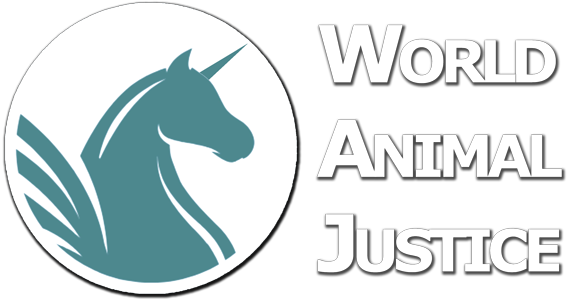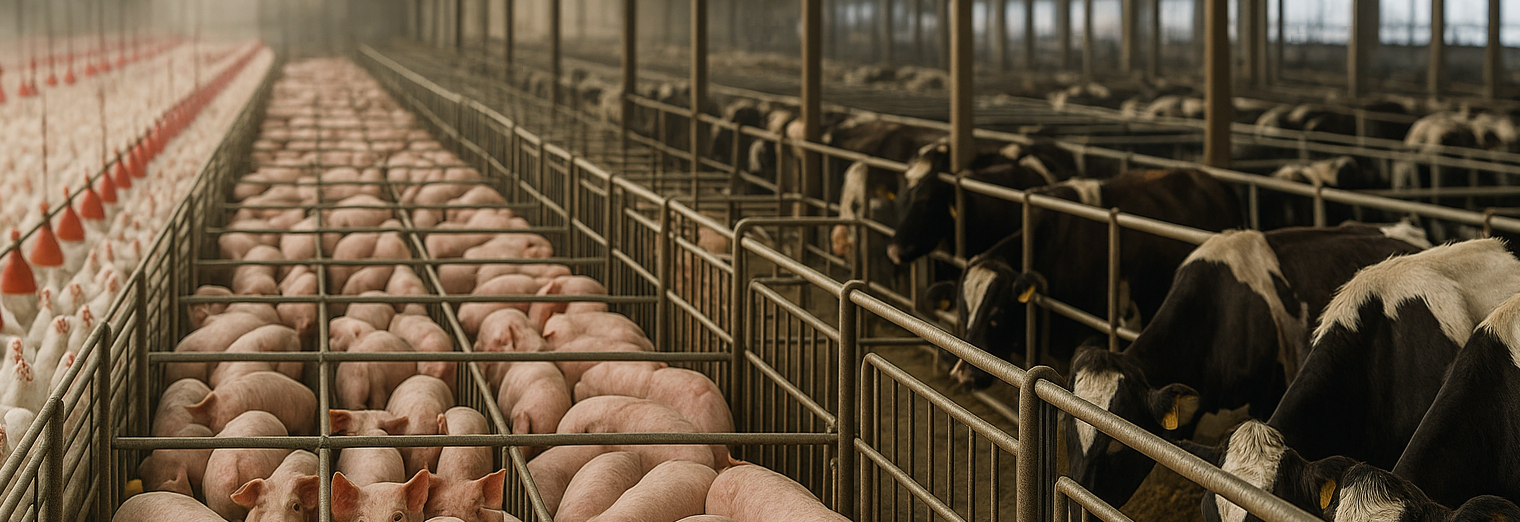France Pushes Factory Farming Forward: The Legal Imperative to Repeal the Duplomb Law
In August 2025, the French Parliament adopted the controversial ‘Duplomb Law’ (Law n° 2025-794 of 11 August 2025). Despite massive public opposition, the Constitutional Council validated Article 3, opening the way for a new wave of factory farming expansion in France.
Much of the attention has focused on the Council’s censorship of the pesticide provision. But the real danger lies in what was left untouched: a model of industrial livestock production that harms animals, undermines environmental protections, and jeopardizes public health.
A Hidden Push for Intensification
Just before François Bayrou’s resignation, two decrees were discreetly published to implement the law. These decrees raise the thresholds under which industrial farms can expand without undergoing full environmental authorization. Expansion can now take place under a simplified regime of “registration” or “declaration” — with far less scrutiny.
Here are the new thresholds:
- Broiler chickens: from 40,000 → 85,000
- Laying hens: from 40,000 → 60,000
- Pigs: from 2,000 → 3,000
- Breeding sows: from 750 → 900
- Cattle for fattening: from 401 → 501
France is already the second country in Europe for intensive livestock farming. Instead of transitioning away from this harmful model, the Duplomb Law accelerates its expansion.
Ignoring the Principle of Non-Regression
The most shocking element of the Constitutional Council’s ruling of 7 August 2025 is its refusal to address the environmental non-regression principle.
Since 2016, French law has enshrined the principle that environmental protections cannot be weakened unless justified by overriding public interest (article L.110-1 of the Environmental Code). Yet, Article 3 of the Duplomb Law explicitly sidelines this principle, dismissing it as a “mere legislative principle.”
This interpretation is highly questionable. The 2004 Charter for the Environment, integrated into the French Constitution, guarantees:
- The right to a balanced and healthy environment (Article 1), and
- The duty of public authorities to protect it (Article 2).
By lowering standards for factory farm oversight, the Duplomb Law arguably violates constitutional rights. The Council’s silence on this point creates legal uncertainty and risks challenges before both national and European courts.
Why the Duplomb Law Is Dangerous
Facilitating the intensification of industrial farms means:
- Animal suffering: extreme confinement, overcrowding, and lack of welfare safeguards.
- Environmental regression: water pollution, greenhouse gas emissions, loss of biodiversity.
- Public health risks: spread of zoonoses and antibiotic-resistant bacteria.
- Rural decline: displacement of small-scale farmers by large industrial operators.
- Climate setbacks: directly contradicting France’s commitments under EU climate law.
This is not a law for the public good. It is a law for a handful of agribusiness actors — at everyone else’s expense.
World Animal Justice Position
At World Animal Justice (WAJ), we strongly denounce the Duplomb Law and call for its repeal.
Title: Risk of incompatibility with EU law – necessity of repeal
COMMENT:
Article 3 of Law n° 2025-794 of 11 August 2025, and its decrees, raise serious compliance issues with both French constitutional principles and EU law:
1- Violation of the non-regression principle
By lowering the level of protection, the law contradicts article L.110-1 of the Environmental Code and undermines the constitutional guarantees of the Charter for the Environment.
2- Incompatibility with EU law
. Breaches the EU’s binding target of reducing emissions by 55% by 2030 (Regulation (EU) 2021/1119, the “European Climate Law”)
. Ignores Article 13 TFEU, requiring that animals, as sentient beings, be taken into account in agricultural policy.
.Contravenes Article 37 of the EU Charter of Fundamental Rights, which requires a high level of environmental protection.
3- Legal risk for France
Exposes the State to litigation risks before the CJEU, whether through preliminary rulings from national courts or infringement proceedings by the European Commission.

Citizens Have the Power to Act
The government rushed these decrees through the day before the Prime Minister resignation, without waiting for parliamentary debate on the citizens’ petition against the Duplomb Law. This shows how fragile the process is — and how important your participation remains.

How to participate:
1- Go to the official consultation page.
2- Scroll down to the bottom and click “Déposer votre commentaire.”
3- You can adapt these messages:
- “Non à ce décret dangereux pour les animaux et notre santé.”
- “Je m’oppose à ce décret qui ouvre la voie à l’expansion des élevages industriels !”
- “Je m’oppose au projet de décret qui constitue un déni démocratique et sanitaire !”
Together, We Can Stop This Regression
The Duplomb Law represents a step backwards for animals, the environment, farmers, and democracy itself. It entrenches factory farming just when France must urgently transition to humane, resilient, and climate-conscious agriculture.



